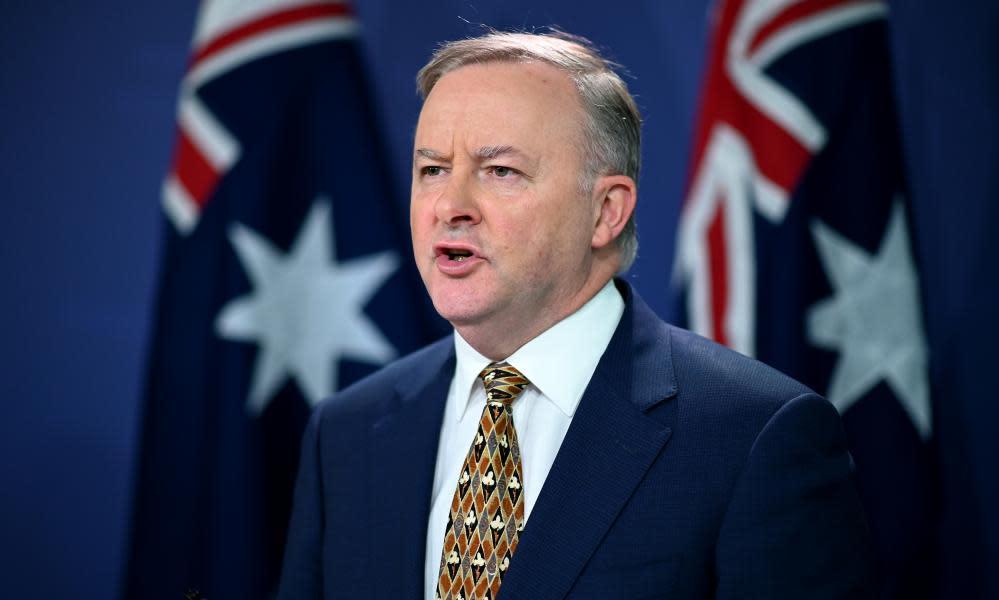Anthony Albanese calls for end to 'productivity recession' amid Labor reboot

Anthony Albanese says he wants to end the current “productivity recession” and reboot Labor’s historic mission to sever the “anchor chain” between social class and destiny – because Australia has now “reached the limits of the Hawke-Keating reforms”.
In the second of the Labor leader’s “vision statements” – speeches aimed at repositioning the ALP after the election loss in May – Albanese will part company from the economic platform of the last parliamentary term, declaring Labor “has learned the lessons from our recent mistakes”.
But he will also argue his party “hasn’t forgotten the lessons of our historic, nation-changing successes either”. Reviving the spirit of the Hawke-Keating reform project, while arguing Australia needs to push past it into new territory, the Labor leader will argue in Brisbane on Friday that boosting productivity “is the key to economic growth, international competitiveness and, ultimately, rising living standards underpinned in large part by long-term, sustainable wage growth”.
Related: Anthony Albanese 'raised concerns' before Labor election defeat
Delivering his economic pivot in Queensland, the state that cost Labor government in May, Albanese will flag doing more in partnership with the private sector, including encouraging Australia’s major super funds to invest in infrastructure and technology. The Labor leader will argue that lifting the rate of compulsory superannuation 9.5% to 12% is not only in the interest of workers funding their own retirements but in the context of broadening the investment pool, “it is also in our national interest”.
Albanese will say he wants to reboot the default productivity debate in partnership with business, unions and civil society, lifting the discussion out of a “one-dimensional focus on industrial relations and work practices” – particularly given pay packets are stagnant, and enterprise bargaining is not delivering real wage improvements.
The “productivity renewal project” needs to focus on increasing wages; on population settlement and the management of Australia’s cities and regions; on climate change, energy and environmental sustainability; on supporting an ageing population and “a health system burdened with long-term chronic conditions”; as well as tackling entrenched, intergenerational poverty – “particularly for those 280,000 jobless households with dependent children aged under 15”.
He will note that annual productivity growth averaged 2.2% when Tony Abbott was elected in 2013, and the rate of growth has now halved, declining over the past two quarters, and with “productivity missing in action, that old anchor chain of class and destiny threatens to make a comeback”.
Albanese will argue the economic policy debate in Australia needs revitalising if we are to realise the potential of our geography, noting our location in the thriving Indo-Asia Pacific – the region enjoying the fastest economic growth in human history – means “the tyranny of distance is giving way to the privilege of proximity”.
Related: Scott Morrison signals environmental overhaul and 'fresh look' at industrial relations
He will say a productivity revival, coupled with micro-economic reform “must also be complemented by sound fiscal policy”. Labor’s new economic framework must have “a soft heart and a hard head”.
Albanese will say Bob Hawke and Paul Keating used fiscal policy to respond to the terms of trade crisis in the mid-1980s, Kevin Rudd and Wayne Swan used fiscal policy to quarantine the nation from the shock of the global financial crisis, and the current challenge is to ensure that medium-term fiscal frameworks provide a stable floor under economic growth.
With the Morrison government keen to portray Labor as the party of panic and fiscal recklessness, Albanese will argue the ALP can manage the necessary economic transition because it has always managed gear changes in the economy.
“I want to lead a fiscally responsible Labor government that invests with an eye firmly fixed on productivity, a Labor government that supports wealth creation as well as its fair distribution,” the Labor leader will say.
“We will never be content to just drift in the tide of good fortune, but we will do what Labor does best – give Australians a strong and resilient economy from which all else flows.”

 Yahoo News
Yahoo News 
